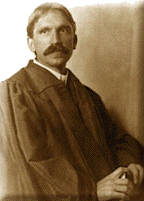October 20: John Dewey
John Dewey (1859)
It was on this date, October 20, 1859, that American philosopher and educator John Dewey was born in Burlington, Vermont. Educated first in Vermont and taking his degree in philosophy from Johns Hopkins University in Baltimore, Dewey gradually shed the strictures of his strict religious upbringing.
Initially from the idealist school of philosophy, he developed the pragmatist school with Charles Sanders Peirce and William James. His philosophical naturalism understood human thought as practical problem-solving which proceeds by testing rival hypotheses against experience in order to achieve the "warranted assertability" that from which correct action derives. But his philosophy was just as tentative as all conclusions are in science, so he maintained that nothing is ever finally and absolutely true. This philosophy made moral progress possible.
Dewey wrote,
Modern philosophy ... certainly exacts a surrender of all supernaturalism and fixed dogma and rigid institutionalism with which Christianity has historically been associated. ... Faith in the Divine Author and Authority in which Western civilization has confided, inherited ideas of the soul and its destiny, of fixed revelation ... have been made impossible for the cultivated mind of the Western world.*
In his Influence of Darwinism on Philosophy (1910) Dewey says that he is not interested in "an intelligence that shaped things once for all, but the intelligence which things are even now shaping," and he endorses the finding of social psychology that there is no fixed "human nature," but a behavior molded instead by social environment. "I believe that many persons are," wrote Dewey, "repelled from what exists as a religion by its intellectual and moral implications."*
Despising militant Atheism, Dewey instead was a Humanist – and also an Honorary Associate of the (British) Rationalist Press Association, which affirms the supremacy of reason. He is chiefly remembered as an educational reformer. But Dewey also worked for social reform, sought laws protecting civil rights for minorities, for the right of workers to organize, and served as a trustee of Hull House, founded by Jane Addams in Chicago.
Dewey defended the right of University of Chicago theologians to express unorthodox beliefs contradicting those of conservative Catholic churches. He said, "Criticism of the commitment of religion to the supernatural is thus positive in import."* Yet it was in Chicago that Dewey truly disassociated himself from organized religion. As he said,
Demons were once appealed to in order to explain bodily disease, and no such thing as a strictly natural death was supposed to happen. The importation of general moral causes to explain present social phenomena is on the same intellectual level. Reinforced by the prestige of traditional religions, and backed by the emotional force of beliefs in the supernatural, it stifles the growth of ... social intelligence.*
In his later years, Dewey allowed the concept of "God," not as an objective reality, but only as a name for the relation of the ideal of conduct to man's capacity. He died on 2 June 1952, age 92. It was John Dewey who said, "There is nothing left worth preserving in the notions of unseen powers, controlling human destiny, to which obedience and worship are due."*
* All quotes from Ira D. Cardiff, What Great Men Think of Religion, 1945; repr., 1972.
Originally published October 2003 by Ronald Bruce Meyer.


